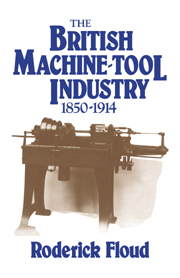Book contents
- Frontmatter
- Contents
- List of tables, figures and appendices
- Preface
- Introduction
- 1 The engineering industries
- 2 The technical history of machine tools, 1850–1914
- 3 The machine tool industry: structure and explanation
- 4 International trade in machine tools
- 5 Greenwood and Batley: history, records and methods
- 6 Greenwood and Batley: markets and prices
- 7 Greenwood and Batley: production
- Conclusion
- List of works cited
- Notes
- Index
Conclusion
Published online by Cambridge University Press: 02 December 2009
- Frontmatter
- Contents
- List of tables, figures and appendices
- Preface
- Introduction
- 1 The engineering industries
- 2 The technical history of machine tools, 1850–1914
- 3 The machine tool industry: structure and explanation
- 4 International trade in machine tools
- 5 Greenwood and Batley: history, records and methods
- 6 Greenwood and Batley: markets and prices
- 7 Greenwood and Batley: production
- Conclusion
- List of works cited
- Notes
- Index
Summary
This book cannot pretend to be a complete history of the machine tool industry in Britain between 1850 and 1914, for too much has been omitted. Either for reasons of space, or because of lack of data, there has been no discussion of the labour force of the industry nor of several of its major foreign competitors, and many important firms and entrepreneurs have been given only passing mention. Instead, three aspects of the industry have been studied in detail: the growth of the machine tool industry and its relationship to the mechanical engineering industries as a whole, the place of the British machine tool industry in international trade, and the production and organisation of one of the most successful of British machine tool firms.
The main conclusion of this study is that, even with a considerable amount of evidence, it is impossible fully to delineate and explain the course of structural and technical change in so complex an industry as that making machine tools. On the other hand, it is clear that any such description and explanation must take great account of the exact nature of an industry's structure and of its relationship with its customers; discussion of technological change in the guise of shifts in the aggregate production function cannot take account of the constant modification of existing machinery and methods which was the characteristic form of change in the machine tool industry.
- Type
- Chapter
- Information
- The British Machine Tool Industry, 1850–1914 , pp. 203 - 204Publisher: Cambridge University PressPrint publication year: 1976



